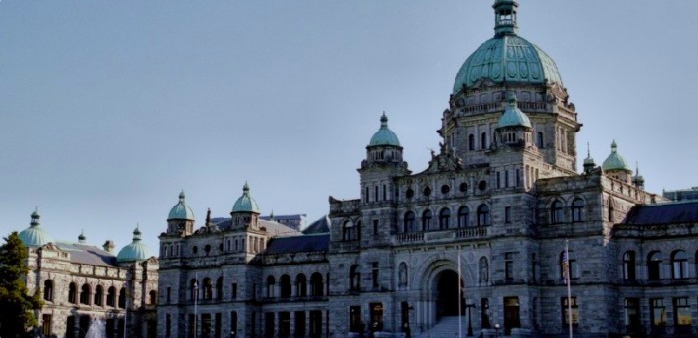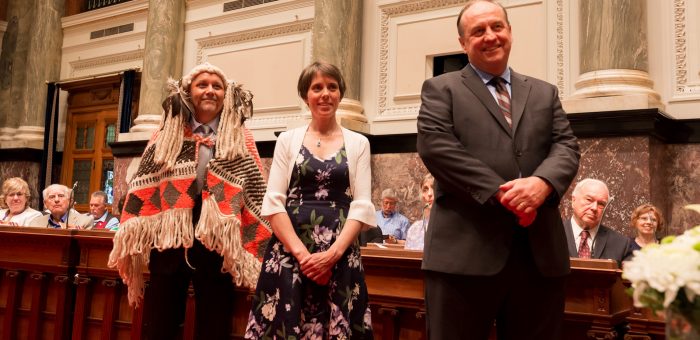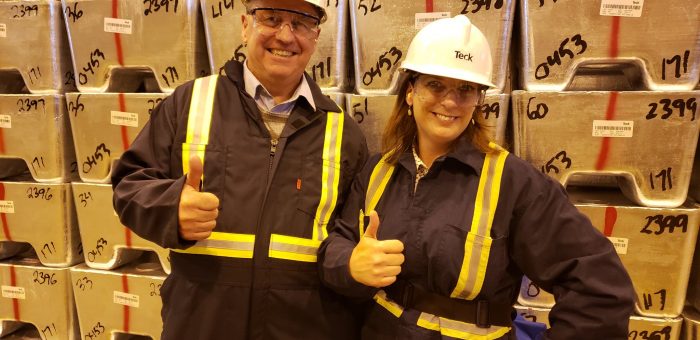First Nations
Responding to the BC NDP 2020 Budget
Today the BC NDP delivered the budget for the next fiscal year. Below I reproduce the media release my office issued in response to it. As you will see from the release (reproduced below), I was pleased with Budget 2020 and I look forward to expanding on these initial remarks when I respond in the legislature hopefully tomorrow.
Media Release
MLA Weaver responds to 2020 Budget
For Immediate Release
February 18, 2020
Victoria, BC — The BC NDP’s 2020 Budget is one that invests in the people of British Columbia and charts a path forward for a sustainable economy that works for everyone.
“I’m delighted to see this government continuing to work towards lowering the cost of living for middle class British Columbians,” said Andrew Weaver, MLA for Oak Bay-Gordon Head. “Actions such as the elimination of MSP premiums which I have long advocated for, the construction of new affordable housing units, the raising of earnings exemptions for those on income and disability assistance, and increased funding for childcare and public education should ensure that the benefits of economic growth in BC are widely shared”.
While the 2020 budget introduces several changes that positively impact the lives of British Columbians now, it is also forward looking, making significant investments into the future of the province and in particular today’s youth. Funding dedicated to increasing the supply of teachers, counsellors, and psychologists contribute to the positive social and cognitive development of our children as they move through school.
The creation of the needs-based, up-front BC Access Grant should equalize post-secondary educational opportunities in the province by allowing students to focus on their studies without worrying about how they are going to pay for their tuition. New 24/7 mental health resources for students at post-secondary institutions should no longer place young adults in a position where they feel like they have to choose between their personal well-being and academic success.
“BC’s 2020 budget also makes necessary infrastructure investments, at a time when access to capital is cheap, to manage a growing population while, at the same time, transitioning the province to a low-carbon economy by linking capital expenditures to Clean BC,” adds Weaver.
The construction of new hospitals, bridges, roads, houses, and schools promise to create numerous good, well-paying jobs in all regions of our province in addition to alleviating strains on public services.
“Innovative design and the integration of BC engineered wood products and energy/energy conservation systems into these capital projects demonstrates British Columbia’s ongoing leadership in recognizing that the reduction of greenhouse gas emissions can be paired with job creation throughout the province,” notes Weaver.
Although the budget does continue to devote resources to projects which I continue to oppose, such as the Site C dam and LNG developments, I am pleased that the government is now demonstrating its commitment to the economy of tomorrow by supporting the emerging bioeconomy, the quantum computing sector, the agri-tech and life sciences. The continued backing of renewable energy projects, ZEVs, and electric aircrafts will make our economic growth largely sustainable.
At its heart, the 2020 budget is one that places people first while embracing the opportunities created by technological and climatic change, ensuring that BC is well positioned to thrive moving forward.
MLA Weaver will monitor the progress and implementation of these budget measures to ensure they benefit the people of British Columbia.
-30-
Media contact
Judy Fainstein
Executive Director
Legislative Office of Andrew Weaver, MLA
+1 250-744-7615 | Judy.Fainstein@leg.bc.ca
Responding to the February 2020 Speech from the Throne
Today in the Legislature I rose to provide my response to the BC NDP government’s Speech from the Throne. The throne speech focused largely on identifying the advances that have already been made and pathways forward to build on those advances for the betterment of British Columbia. I spoke in strong support of the throne speech as outlined in the text and video of my response (reproduced below).
Text of My Response
A. Weaver: Thank you to the members of government here who give a little applause as I rise as an independent member to speak in strong support of the throne speech we heard yesterday.
Before I start, I wish to acknowledge and thank government for raising and acknowledging the passing of a number of friends and constituents: Al Martin, a neighbour, a conservationist, a friend, a great British Columbian; Nils Jensen, former Oak Bay mayor, a friend, a great British Columbian; Eli Pasquale, who went to UVic at the same time as me and was in the rival basketball team, as I was in the rival rugby team, who passed away at the young age of 59 — his number 13 has been retired at the University of Victoria — and of course, Paul Fraser, who we all know in this Legislature, who I became very close to over the years. He will be a great loss to all of us and British Columbia in general.
I’d like to start by addressing some of the issues in the throne speech. Now, with respect to the throne speech, it’s quite clear that the throne speech focussed largely on identifying the advances that have already been made and pathways forward to build on those advances for the betterment of British Columbia. Government has, in its throne speech, mentioned that it has already got big money out of politics and strengthened lobbying rules.
As the former leader of the B.C. Green Party, I feel very strongly that these are quite good policies and take great pride in the role that we played in working with government in ensuring that transparency and getting big money out of politics was done early in the term.
I would like to address, before I move on, an issue raised by the member for Kelowna West with respect to closing trade offices. Now, again I’m going to commend government for doing precisely that and doing what virtually every other province in Canada does, which is recognize that you are not a province in isolation of a country and your trade offices should be embedded in national offices to ensure that you capitalize on national opportunity, for which British Columbia has strategic advantage.
The fact that the previous government went rogue alone is quite remarkable. There are still many questions left as to what value was ever achieved from those multi-million-dollar leases for trade offices that were only used for British Columbia. So I commend government for their moves in this regard, and I think many fiscally responsible people will also look at that as a great achievement. It will not affect trade, and if anything, it will expedite the passage of information between provinces and the nation of Canada and enhance trade with our beautiful province.
To health care. I’m very proud of what government has done and the small role we’ve played in some of this — in the issues of MSP, for example. This is one that I personally take great pride in, for it was about five or six years ago that I stood in this Legislature and announced that the B.C. Greens would eliminate MSP as part of our campaign promise.
We feel we deserve a bit of credit for getting both parties — both the B.C. Liberals and the B.C. NDP — to recognize that public support for the elimination of MSP was so strong that really you couldn’t go forward into an election without making that a form of a campaign promise. To see it come to fruition is very, very satisfying, and I thank government for making that happen.
Government has taken the approach, a wise approach in my view, to recognition that, at times now, when capital is cheap, that is the time you use capital to invest in the province. We’re seeing funding of new hospitals and primary care centres. We’re seeing funding of new schools. And I’ll come back to that in a second. This is the time to do it, when the capital is cheap. I think that government deserves a good deal of credit for its ventures down this avenue.
I’m still hoping and still working with government to ensure that they recognize that each and every school and hospital that is built should be viewed through the eyes of innovation, as an opportunity for innovation, to showcase British Columbia technologies, British Columbia–engineered products — we’ve heard that in the throne speech today — as well as British Columbia energy efficiency and British Columbia renewable power.
We’ve got new diagnostic machines and funding for more health care professionals. I can tell you that one of the most important pieces of change that government has done in the last two years in the health care file is opening access to MRIs 24-7.
I personally have benefitted from that, and my wife has benefitted from that as well — many times, in fact. The months and months that people had to wait for diagnostic tools like MRIs was unacceptable, and the steps taken by Minister Dix in this regard truly deserve a lot of credit. We see money going into mental health services. We see money going into funding more professionals, seniors getting direct care.
On the issue of affordability, despite the rhetoric I just heard from the member for Kelowna West, government has done a remarkable job in delivering on the affordable file. We’ve seen a slow tempering of the market, a decrease at the higher end of the market in Vancouver – not a collapse, a tempered decrease, exactly the type of tempered decrease the market can absorb. Much of that artificial speculation that occurred has been tempered. Housing is becoming more affordable, and I look forward to working with government, along the lines as we did with the speculation and vacancy tax, as we move forward to deal with other rental and tenancy issues.
In particular, the speculation tax, which many in this room, including me when it was first introduced, felt was not thought through completely. The final implementation of that, I would argue — and I believe the Minister of Finance would, too, after many hundreds of hours of negotiations back and forth – is working. It’s working so well that there are jurisdictions like Tofino, like West Vancouver, that are asking to be included in such speculation tax to deal with this.
Interjection.
A. Weaver: I am hoping….
Yes, to the member who said “Really?” Yes, really. It’s actually….
There are other issues that I would like to, hopefully, see addressed as we move forward in this session with respect to rental, tenancy act issues. You know, one of the things I would like to explore is the notion — and I will be doing this on my blog shortly to get a sense of public opinion — that there is unfairness in the present system right now.
Let us suppose I live in Ontario, and I have a vacation condo in Victoria, and that vacation condo happens to be in a strata that has a “no rental” clause. Well, guess what? I don’t pay the vacancy tax because there’s a no rental clause in my strata. However, if I was the same person’s neighbour in Ontario and I had a vacation condo in a strata that allowed rentals, I would be subject to the speculation tax unless I rented it.
In my view, what we need to do in this province in a timely fashion is follow the lead of Ontario. In Ontario, they’ve eliminated the ability of strata councils to actually have no rental clauses attached to them. But in doing so, they allowed stratas to enable the banning of limited rentals – i.e., Airbnb or vacation rentals – and at the same time, grant to strata council the powers of eviction – the idea being that if there is an absent landlord, who is actually not looking after the property, council has the powers of eviction.
This, in and of itself, will create a vast amount of units. We don’t need to build more empty units. We can go to Metrotown in Burnaby. There are skyscrapers of empty units, with no rental clauses. What we need is we need units to be used. This, in my view, would be the single most important policy that I hope government will deliver upon in this coming session.
I’m also excited by the words that we saw in the throne speech about ICBC and the reforms that are forthcoming. Now, I recall in September of 2017, very shortly after Minister Eby took the role of Attorney General, he stood and he spoke out and said: “I’m not considering no-fault insurance.” At the time, I issued a press release, and I said: “Why would he do this?” Why would you take off the table ideas before you’ve actually looked at the books? Why would you not look at the model from Manitoba, having some of the lowest rates in the country, where they have a no-fault system?
We have the analogy in Saskatchewan, which is slightly different – and I know members from opposition will at some point raise it – in Saskatchewan it used to be no fault, and why over 90 percent of people in Saskatchewan are still no fault, the reason why is because it was no fault for a long time, and then they were allowed to potentially soon opt out of that, at a later date, and only a very few people did.
I think this approach to no fault is certainly going to be one that will get to the bottom of the books of ICBC. I mean, it’s a file that really has been neglected for some time by members of the opposition. I think they have to be very careful when they speak and try to pass blame on the present government in light of what they left behind. I think, in the words of the Attorney General, “a dumpster fire,” it was described as.
Education. You know, we come back to the economy. Again, I know the B.C. NDP like to be branded by the B.C. Liberals as bad for the economy. But we’ve had already balanced budget after balanced budget, and I’m convinced the next budget will be balanced with the triple-a credit rating being maintained and the strongest economy in the country. People want to live here. They want to come to British Columbia. Why? Because we are the most beautiful place in the world to live. We have a strong stable democracy, and we can offer everything.
Schools. Our school system in British Columbia is one of the top in the world. It ranks in the top five year after year in the international PISA assessments, ahead of the much-touted Finland, ahead of the much-touted Quebec. We are the very best. We have some of the best schools and best teachers in the province, and government now has invested substantively in more services for schools as a direct consequence of having to implement the rulings of the Supreme Court.
That, frankly, wasted a decade and, frankly — I’ve said this publicly — has led to a decade of children, a whole generation of children, not getting the services they needed at the times they needed in their early developmental years. From 2001 to 2017, for those 17 years, a generation of school children had their child psychologists cut, their speech pathologists cut, the in-class help cut, class size increases.
What would you expect as a result of that? Well, what you would expect is that as those children age out into adulthood, you’d start to see troubles in society. And lo and behold, guess what, delayed, down road, we’re dealing with an opioid crisis. We’re dealing with a homeless problem and an out of control….
Interjection.
A. Weaver: It is not a far reach.
Interjection.
A. Weaver: It’s interesting. One of the members opposite, who is a teacher, doesn’t clearly understand the research in education.
Interjection.
A. Weaver: Well, clearly you don’t, because it is very clear that the interventions in early years of child education are absolutely critical to put the children, particularly in their K-to-3 years, on the right paths for success. If you don’t catch it early, you have to pay down the road. That falls squarely on the B.C. Liberal government.
To the First Nations, I was very proud to be part of this collective group. There is no one individual. Collectively, the passing of UNDRIP legislation last year. I’m looking forward to seeing how that moves forward.
We see in the throne speech words about safety and policing. We see about increased diversity and inclusion and how a human rights commission has now been improved. There’s talk in the throne speech about what’s being done in the arts and culture and museums. Transport and rural development were there.
One of the key things that has been done — again, I’m very pleased with this; this is something we’ve been advocating for, for a long time — is the beginning of taking high-speed broadband into rural communities. You want to stimulate the economy of rural communities? It’s not going to happen until you bring broadband in.
The only way we’re going to compete in the resource world is not to just dig dirt out of the ground and think, somehow, we’re going to beat, say, Indonesia, which doesn’t internalize the social and environmental externalities we value here. The way we do that is we’re smarter, more efficient and cleaner. We do that by bringing the technology sector together with the resource sector. We do that by focusing on the value-added. We do that focusing on efficiency, cleaner and selling those technologies elsewhere, like MineSense, Axine or others. I was so very pleased, so very pleased to see that recognized in this throne speech as a direction this government is going.
I feel that this government is on the right track. It understands where the future of our economy is. It doesn’t lie in continuing to dig dirt out of the ground. It never will. It lies in innovation. It lies in the harvesting our resources in innovative ways by bringing the tech sector together with that.
You know, a member opposite lauded the $2.7 billion surplus that the last Liberal government left, and seemed to think that that was a good thing. It’s remarkable that this was actually raised — that this $2.7 billion number was touted as a good thing to have as a surplus — when we have the highest child poverty rates in the country, when we have over a decade with disability and welfare rates not being increased, where we have homelessness getting out of control and we have a $2.7 billion surplus. It’s outrageous fiscal mismanagement at its very, very worst.
The Liberals, who claim to be these managers of fiscal prowess, actually demonstrated fiscal incompetence in their budgeting in that last year. We see that not only in the $2.7 billion surplus, but we see that in the money-laundering issue going on, we see that in the out-of-control speculation in the real estate market, and we see that with what has happened to some of our most vulnerable, as they’ve been on the streets.
So I say that B.C. Liberals, as I said a while back, needed to be put in a time-out for some time. I’m still convinced that that time-out is not over yet. There needs to be a longer time-out until such time as the opposition starts to recognize that you have to govern for the people of this province, not for those who are your funders, not for the elite, not for the 1 percent. If you start governing for the 1 percent, you end up seeing what we see all around us today.
We see very disturbing trends emerging. We see society splitting into two ways. We see the kind of Trump, and we see the anti-Trump. We see these two kinds of polarizing views of society, the Trump far right and the anti-Trump, almost anarchist. This is a very, very dangerous situation that the world is moving towards. It does not help when we polarize this place and continue to suggest that one side is far better than the other. We must, for the betterment of all our society, start to recognize that we are in turbulent times.
When unruly mobs like this feel like they’re not being heard, it doesn’t lead well. We have ample, ample examples in human history about how it ends up. I don’t need to do history lessons here. The way it ends up is when income inequality gets out of control — when, for those who have, compared to those who don’t have, that gap grows more and more — that sows the seeds for discontent. Each and every time in human history where that has happened, revolution has occurred.
We don’t want that to happen in Canada. We’re a nation of peaceful people. We’re a nation built on immigrants. We’re a nation of openness and of multiculturalism, of awareness, of progressive policies.
We must govern for everybody and recognize that there are some in our society who have a bit too much — maybe some of them have earned it hard; some of them have just inherited it — and there are some who have just lost the lottery of life. It’s not like they knew they were going to be born into poverty. They just lost the lottery of life. Others might have been born into and won the lottery of life. That doesn’t mean you’re a better or a worse person.
As legislators, in my view, it behooves us to recognize that we have a duty to ensure that society is stable, that we actually help those who need the help, and that we say, to those who have some more: “You know what? Our society, collectively, is better if you give us a little bit more to help those who don’t, because we know what happens in human history if the elite go off over here and everyone else is down here.”
You might want to ask: “What happened in Russia?” Or you could talk about the French Revolution. You could talk about myriad examples like this around the world. This is not what I want to see British Columbia and Canada become.
Coming down to the direct quote from the speech. I want to read this, because to me…. I was blown away, to be blunt. I was very pleased to see this. Directly from the speech, it says this:
A strong economy cannot be built on a foundation of rampant real estate speculation. It cannot be won in a race to the bottom, with minimum standards and fewer workplace protections. And it cannot be gained through windfall profits earned on the backs of low-wage workers.
Instead, a strong economy comes from good-paying jobs that raise family incomes and everyone’s standard of living. It is built with quality public services as a cornerstone, services that help B.C. grow, attract and keep its skilled workforce.
“A strong economy is rooted in competitiveness, a necessary ingredient for success in today’s global marketplace. And it is in harmony with government’s commitments to fight climate change and achieve meaningful reconciliation with Indigenous peoples.
“These are the values that guide this government’s actions to build a sustainable economy that puts people first. The challenges we face, from worsening weather to global economic headwinds, make this work more urgent than ever.”
I’ll stop there and pause there and say that those words are remarkable. It is essentially saying, in the throne speech, that government gets what the challenges are. Then it moves on to say how it plans to deal with those challenges.
“As this government charts a new course to a low-carbon economy, powered by CleanBC, British Columbians can rest assured that not only will we weather these storms; we will create the conditions for people and industry to thrive.”
“CleanBC is a critical part of this government’s strategy to grow a sustainable economy with good jobs and opportunities for people. It’s been one year since CleanBC was launched, and British Columbians are starting to see that the way to a cleaner, better future is by innovating and working together.”
The change that has happened in one year is remarkable, whether it be as simple as just saying: “Look at how many electric vehicles there are….” Now, you might say: “Oh, electrics vehicles. Whatever.” That’s stimulating the economy. We have B.C. builders of electric vehicles.
We now have Harbour Air seeing the opportunity and seeing British Columbia with the signal that this government has sent, the signal that it sent to the world, that we want to be leaders in clean tech. Harbour Air, the first electric airplane in B.C. This is what you get.
We have Corvus building batteries now for Norwegian ships. We have Portable Electric building diesel generator replacements. Innovation in British Columbia is growing, and the single-biggest seed for that innovation is signals that governments can send saying: “We’re here to support you and nurture you.”
The creation of the innovation commissioner — one of my very dear platforms — has been very, very successful as well. If you track the additional moneys British Columbia is now levering out of Ottawa, we historically have been dreadful — and it falls squarely on the B.C. Liberals — at leveraging the pools of money that exist in Ottawa if you have matching funds here in British Columbia.
One of the first things, in discussions with the innovation commissioner, we talked about was ways to actually lever that. It’s happening now. That bodes well for innovation, and that bodes well for the B.C. economy.
You know, it further says here…. Well, it said in the speech…. It talked about the innovation commissioner as well. Also, it talks about that the government is going to have plastics action plan and climate adaptation plan. It’s pretty clear that the government is taking this issue seriously and that it will work with business to promote B.C. businesses as competitive suppliers of low-carbon products. There’s a lot in those small words.
We know that there are consumers out there who want to buy products that are low carbon. We know there are businesses who want to be viewed as benefit companies, which the legislation that was passed by government…. Well, I guess it was my legislation that we all passed. These small signals actually have much greater influence and emphasis on what actually happens in our economy. We’re seeing that now.
We see that government has a potential here to actually stimulate. It’s mentioned in the throne speech that it plans to do that by saying: “Okay. We as government can’t tell you what to do unless we’re willing to model the leadership we expect in others.” Government is going to start using, where possible, B.C.-based engineered wood products in its construction.
Government could continue to advance this by focusing its procurement process on B.C. innovation in a diversity of areas, and I’m convinced that that will happen as we move ahead.
You know, I don’t want to dwell on LNG, because, to be perfectly blunt, I will believe it when I see it.
I know we’re having fights over the Coastal GasLink pipeline. I know people are touting LNG Canada and the, let’s say, $40 billion investment — which it really isn’t because most of that’s being built in Asia and brought up on tide line and then getting steel tariff exemptions, etc.
However, the market for LNG is in the dumps. It doesn’t make fiscal sense right now, and I still will argue that you might get something at some point, but I wouldn’t be counting your pennies on getting any money from LNG. The deep-well credits, $3.2 billion accrued to be used against future royalties…. I mean, there are no royalties coming from natural gas in our province.
The construction of Site C, of course, means that we the ratepayers, not the ratepayers in Kelowna, mind you, because they’re with Fortis…. We the ratepayers in other parts of B.C. are going to end up paying 15 cents a kilowatt hour for electricity that we sell to LNG Canada for 5 cents and change a kilowatt hour. We know that there is going to be no LNG income tax act, so we know they’re going to get exemptions from carbon tax increases.
This scale of subsidy, in my view, is unacceptable. But even given that, I’ll stand here and say I don’t believe LNG will ever be delivered out of Kitimat, because the market simply will not be there. For these multi-billion-dollar companies, they kick the can — $1 billion here, $10 billion there. That’s the cost of doing business. Let’s see what actually happens down the road.
You know, I’ve been to a number of natural resource forums over the years. I’ve been a strong proponent of mining in this province, but again, mining in this province, as articulated and realized in the throne speech…. We will never compete by just going in with a pickaxe and digging dirt out of the ground. We’ve got to be smarter. We get companies like MineSense doing that. We find ways and means of extracting ore in clean ways that use less energy, that use less water, that actually make us more able to reclaim the land. That could be done so more efficiently.
You can grow an economy by making it bigger, by building more stuff, or you can grow an economy by building the same amount of stuff more efficiently. That is where our success will lie, through efficiencies and cleanliness and exporting the knowledge we have developed here.
I come to B.C. Hydro, which was mentioned, albeit passingly, in the throne speech. There’s still a lot of work that needs to be done in B.C. Hydro. Over the course of this session, I hope to use my question period times to focus on specific examples, in this regard, of the opportunities that are potentially lost, as B.C. Hydro seems to be a little bit of a behemoth that needs to be reined in, in some sense, to ensure that we actually allow competition, allow innovation in the energy sector, and we allow the partnership of small projects, existing projects with users of energy as well.
Forestry — another sector that was mentioned. I’m very pleased to see that the government recently got the settlement on Vancouver Island. That’s good news. Honestly, I think it’s very rich, again…. I mean, I don’t want to dis on the B.C. Liberals. I’m reacting to the comments I heard from the member for Kelowna West, who basically hurled abuse about the forest industry on the B.C. NDP. For heaven’s sake, we lost 30,000-something jobs. We’ve known mills were closing under their watch as well.
This is not a partisan issue. This is an issue that affects all of us. We need to put our collective minds together to think about how best to rejuvenate British Columbia’s forest industry. Is it really the tenure system? Does that really apply in the 21st century? I would suggest not. I would suggest that the tenure-licensing system has been the cause of the death of a lot of our forest industry. What we need to do is move to more of a temporary lease or more of a community-based approach to forest logging.
With that said, taken together, I’m absolutely thrilled to support this throne speech. I feel very pleased that some small part of that has been accomplished through the good work that was done through the collaboration that I have had and I know my former colleagues have had with a number of ministries. In my case, I would like to thank the Minister of Finance, who I held the files for, the Ministry of Attorney General, the Premier of course, the Housing Minister, Health ministers, Energy and Mines, who I’m really excited about looking forward to working with on the innovation file.
We’ve already started communication in that regard. I think this is a great appointment. The former Minister of Energy and Mines is moving to be the minister of innovation. I think that’s exactly what that ministry needs. We’re already met and ready to go.
I thank you for your attention. I look forward to a positive vote on the throne speech.
Video of Response
Declaration Act passes unanimously, a crucial step forward for reconciliation efforts
Today was an historic day in the legislature as Bill 41: Declaration on the Rights of Indigenous Peoples Act passed third reading with unanimous support of all members of the house. The passage of this bill was a foundational piece of the Confidence and Supply Agreement that enabled us to support the BC NDP minority government. My colleagues ans I are thrilled to have played a part in ensuring that British Columbia is the first jurisdiction in North America to pass this legislation that implements the United Nations Declaration on the Rights of Indigenous Peoples into law.
Below is the press release my office issued upon the passage of the bill.
Media Release
Declaration Act passes unanimously, a crucial step forward for reconciliation efforts
For immediate release
Nov. 26, 2019
VICTORIA, B.C. – The Declaration on the Rights of Indigenous Peoples Act passed unanimously today and marks a historic moment for British Columbia.
“Passing the Declaration on the Rights of Indigenous Peoples Act today is a significant milestone on our path to reconciliation,” said B.C. Green MLA Adam Olsen for Saanich-North and the Islands and a member of Tsartlip First Nation. “This act represents a foundational change in approach to how government interacts with Indigenous people in the future, and I look forward to the work ahead.
“Generations of Indigenous people in Canada have fought to reverse the discriminatory laws and actions of successive governments. Today, for the first time in our province, we are using the powers of the Assembly to take a step towards reconciliation. I raise my hands to all who have come before and laid the foundation for this Act.
“The legislation does not immediately solve all conflict in our province, but it is my sincere belief and the belief of the B.C. Green Caucus that it puts British Columbia on a path of greater certainty. Our province has been limited by the uncertainty of litigation, and now, rather than conflict there is an opportunity of increased collaboration and of economic prosperity that is fairer for everyone.”
Bill 41 acknowledges the basic human rights that generations of Indigenous people have fought to have recognized and that have existed in Canada’s constitution for decades. This bill affirms these existing rights and is a concrete step to undo the colonial legacy imposed on Indigenous people for generations. Implementing the United Nations Declaration on the Rights of Indigenous Peoples into legislation was a key recommendation from the Truth and Reconciliation Commission.
“Social justice and respect of diversity are more than core principles for the B.C. Greens, they are values that every British Columbian can embrace. And, today, MLAs stood united in support of those core values,” said B.C. Green Party Leader Dr. Andrew Weaver, MLA from Oak Bay- Gordon Head. “The passage of this bill was a foundational piece of the Confidence and Supply Agreement that enables us to support this NDP minority government.”
British Columbia is the first jurisdiction in North America to pass legislation that implements the United Nations Declaration on the Rights of Indigenous Peoples into law. BC is home to the second largest population of First Nations in Canada, according to Stats Canada.
“In my riding, I regularly see firsthand how a discriminatory and dysfunctional approach from governments over the last hundred years has led to sustained intergenerational trauma that continues today and will take many years of hard work to overcome,” said MLA Sonia Furstenau for Cowichan Valley. “The passage of this bill is a step forward that leaves me optimistic for the future – one that doesn’t ignore basic human rights but treats all people with respect and aims for collaboration rather than conflict.”
A commitment to adopting the UN Declaration on the Rights of Indigenous Peoples in B.C. is a component of the Confidence and Supply Agreement between the B.C. Green Caucus and the BC NDP government. In 2017, every Cabinet minister in the provincial government was tasked with a mandate to implement the UN Declaration and the Truth and Reconciliation Commission’s Calls to Action.
-30-
Media contact
Macon L.C. McGinley
Communications Director and Press Secretary
B.C. Green Caucus
+1 250-882-6187 |macon.mcginley@leg.bc.ca
Presenting at the Clean Energy BC Spring Conference: Powering Generations — Legacy to the Future
Today I had the distinct honour of giving a keynote presentation at the 2019 Spring Conference of Clean Energy BC whose theme was Powering Generations: Legacy to the Future. After the presentation we toured the Teck smelter in Trail to explore innovation in the mining sector first hand.
Below I reproduce the text and slides of my speech.
Text and Slides of Speech
It’s a distinct honour for me to be invited to address you, the delegates to Clean Energy BC’s Spring Conference: Powering Generations: Legacy to the future.
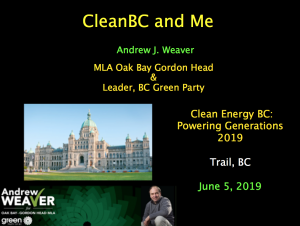 Over these past 25 years Clean Energy B.C. has been the voice of British Columbia’s Clean Energy sector and I am sincerely grateful for your ongoing contributions to our province.
Over these past 25 years Clean Energy B.C. has been the voice of British Columbia’s Clean Energy sector and I am sincerely grateful for your ongoing contributions to our province.
The BC Green Party and I share your goal to support the growth of British Columbia’s clean energy sector and we will continue to do what we can to improve the regulatory and economic environments for clean energy production through our work in the B.C. legislature.
Since first getting elected in 2013, I’ve watched growing uncertainty emerge in British Columbia’s clean energy sector. I’ve watched the Canadian Wind Energy Association pull out of BC. I’ve watched BC Hydro’s standing offer program grind to a halt.
I’ve witnessed the release of a poorly researched report to justify government’s ideological position on independent power producers. And I’ve watched a growing sense of overall frustration emerge as your sector struggles to remain viable.
Of course, as we all know, government’s decision to proceed with the construction of the Site C hydroelectric project was both unnecessary and fiscally-foolish.
It has undermined the investments many of you made in clean energy here in BC. And it puts the ratepayer on the hook for inevitable cost overruns down the road.
But we are where we are and for me, it’s important to look ahead.
I entered politics via an unusual route. By now, most of you know that prior to my election as the MLA for Oak Bay – Gordon Head (and subsequently becoming leader of the B.C. Green Party), I was Lansdowne Professor and Canada Research Chair in Climate Modelling and analysis at the University of Victoria.
I’d served as a Lead Author on the United Nations Intergovernmental Panel on Climate Change 2nd, 3rd, 4th and 5th scientific assessments. I was Chief Editor of the Journal of Climate and I had the honour of participating as a member of BC’s first Climate Action Team set up in 2007 under Gordon Campbell’s leadership.
The year 2007 was a remarkable period in British Columbia’s history with respect to the development of climate policy. It was also a particularly noteworthy time for me.
I’d been publishing papers in the field of climate science for more than two decades, all the while listening to political leaders around the world talk about the importance of dealing with global warming while concomitantly doing virtually nothing to reduce greenhouse gas emissions and offering staggering subsidies to the fossil fuel sector.
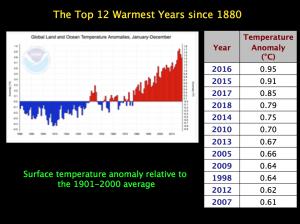 But in 2007 in British Columbia I finally saw a government take the matter seriously and recognize the challenge of global warming for what it was: an economic opportunity for innovation like never before. Gordon Campbell recognized that early leadership would pay off and that all eyes in the world would be turned to BC in 2010 when we hosted the Winter Olympics.
But in 2007 in British Columbia I finally saw a government take the matter seriously and recognize the challenge of global warming for what it was: an economic opportunity for innovation like never before. Gordon Campbell recognized that early leadership would pay off and that all eyes in the world would be turned to BC in 2010 when we hosted the Winter Olympics.
On November 20, 2007 the Honourable Barry Penner, Minister of Environment, introduced the Greenhouse Gas Reduction Targets Act, which put into law British Columbia’s 2020 reduction target of 33% and a new 2050 reduction target of 80% relative to 2007 levels.
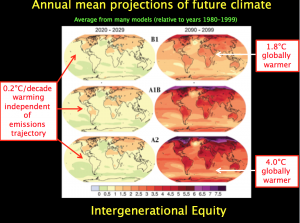 The act also required carbon neutrality for the public sector, including universities, schools, hospitals, Crown corporations, and the government by 2010. And over the next several years as government rolled out its policy measures, BC head off on a path to meet its legislated targets.
The act also required carbon neutrality for the public sector, including universities, schools, hospitals, Crown corporations, and the government by 2010. And over the next several years as government rolled out its policy measures, BC head off on a path to meet its legislated targets.
But all of our successes started to unravel shortly after British Columbia’s provincial leadership changed in 2010. In fact, every year since the 2011 change of leadership, emissions have gone up.
Why? Because of the signal government sent to the market that our emissions reductions targets no longer mattered — that economic prosperity would be found in industries from the last century, and that they would help take us back there.
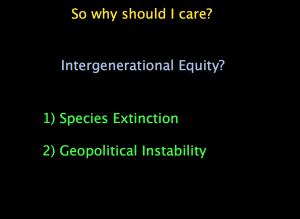 It happened almost immediately after the leadership of the BC Liberals changed. In fact, I remember participating with Judith Sayers, Paul Kariya and Graham Horn (from Innergex) at a press conference hosted by Clean Energy BC in September 2011 where we pleaded with government to stick with its plan to become self-sufficient in clean energy.
It happened almost immediately after the leadership of the BC Liberals changed. In fact, I remember participating with Judith Sayers, Paul Kariya and Graham Horn (from Innergex) at a press conference hosted by Clean Energy BC in September 2011 where we pleaded with government to stick with its plan to become self-sufficient in clean energy.
In 2012, knowing that scientists had done their job in defining the problem and that it was up to politicians to do theirs if we are to deal with the challenge of global warming — and they are not — I accepted an invitation to run as a candidate representing the BC Green party. I could no longer sit on the sidelines as the legacy of Mr. Campbell’s climate leadership was dismantled.
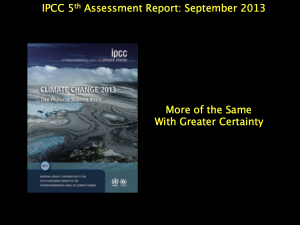 The BC Liberals under Christy Clark had stifled clean innovation and introduced policies that further entrenched “dig-it and ship-it” oil and gas development.
The BC Liberals under Christy Clark had stifled clean innovation and introduced policies that further entrenched “dig-it and ship-it” oil and gas development.
And were the BC Greens not holding the balance of power in a minor government, I fear that the BC NDP would be no different (as witnessed by the outrageous giveaway involved in their proposed further subsidies to the LNG industry).
When the market no longer supported these activities, successive governments doubled done by creating more and more subsidies in a desperate attempt to squeeze water from a stone.
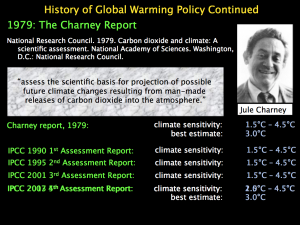 I often reflect back on the spring of 2017 when my colleagues and I were locked in negotiations with both the BC NDP and the BC Liberals as we hashed out the foundations of a confidence and supply deal. I reflect back to remind me of why I got into politics and why we ended up supporting a BC NDP minority government.
I often reflect back on the spring of 2017 when my colleagues and I were locked in negotiations with both the BC NDP and the BC Liberals as we hashed out the foundations of a confidence and supply deal. I reflect back to remind me of why I got into politics and why we ended up supporting a BC NDP minority government.
Climate scientists had done their job in defining the problem and that it was up to politicians to do theirs if we are to deal with the challenge of global warming. Only the BC NDP appeared serious in its desire to reduce our greenhouse gas emissions.
And so the seeds were planted for what would end up becoming CleanBC.
CASA – our confidence and supply agreement – underpins B.C.’s minority government. It is an agreement to work in good faith, with no surprises, with the B.C. NDP.
 CASA has provided the B.C. Green caucus with an opportunity to champion key aspects of our economic platform, and the ability to work in partnership with government on our priority issues like climate policy.
CASA has provided the B.C. Green caucus with an opportunity to champion key aspects of our economic platform, and the ability to work in partnership with government on our priority issues like climate policy.
From our perspective, of course, these two files are one and the same.
Two key elements of our 21st century economy platform were embedded in the CASA agreement to help us identify and hence seize economic opportunities in the emerging economy.
The first was the Emerging Economy Task Force set up to advise government on how to respond and adapt to emerging economic challenges and opportunities. Government needs modernizing so that it is considerably more responsive to technological innovation.
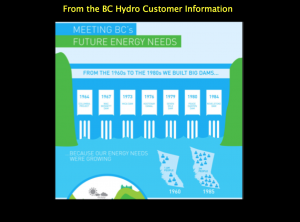 The Emerging Economy Task Force looks to the future, identifying emerging trends and advising government on how to maintain our competitiveness and achieve prosperity amidst these changes.
The Emerging Economy Task Force looks to the future, identifying emerging trends and advising government on how to maintain our competitiveness and achieve prosperity amidst these changes.
The second element from our platform integrated into CASA was the Innovation Commission (now Innovate B.C.) as well as the appointment of an Innovation Commissioner.
The innovation commissioner serves as an advocate and ambassador for the B.C. technology sector in Ottawa and abroad, to enable B.C. companies to more easily tap into existing federal programs and build key strategic relationships internationally.
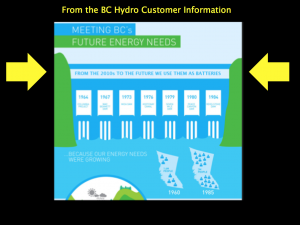 I’m confident that both of these initiatives will continue to bolster and grow key sectors of our economy.
I’m confident that both of these initiatives will continue to bolster and grow key sectors of our economy.
But of course, the most important words in CASA from my perspective are:
“Implement a climate action strategy to meet our targets”
which is why we pushed government to legislate these in the spring of last year:
GHG emissions are to be reduced by at least 40 per cent below 2007 levels by 2030, 60 per cent by 2040, and 80 per cent by 2050.
Targets without a plan to meet them are not worth the paper they are written on. Canadian political history is littered with a legacy of missed targets. And that’s why we turned our attention to delivering a pathway to reach these targets.
A meaningful climate plan requires careful planning, innovative ideas, and a new economic vision for how B.C. will prosper in a changing and challenging world.
If we are to meet our legislated targets — we will be doing so with clean energy — likely following the lead of people in this room.
In that regard, B.C. is setup to succeed. From our access to cheap, renewable energy, to our educated workforce, to our innovative business community, to the quality of life we can offer here, together with British Columbia’s natural beauty, we have an opportunity to develop our Province into one of the most prosperous jurisdictions in the world.
 Our challenges are too big, and the consequences too profound, to ignore this opportunity.
Our challenges are too big, and the consequences too profound, to ignore this opportunity.
We stand to gain by building on the expertise that our neighbours have already developed in these areas. And yet, there is still so much room to grow in this sector, to improve upon current technologies and policy innovations.
The approval Site C was a terribly disappointing decision for me because I believe small-scale, distributed energy projects are the way of the future for B.C. and that we should fundamentally change the mandate of B.C. Hydro.
B.C. Hydro should no longer be the builder of new power capacity.
Rather, it should be the broker of power deals, transmitter of electricity, and leveller of power load through improving British Columbia power storage capacity.
Let industry risk their capital, not taxpayer capital, and let the market respond to demands for cheap power.
We need to optimize support for clean energy development, including grid storage for community or privately generated power and work with neighbouring jurisdictions to expedite the phase out of fossil fuel powered electricity generation.
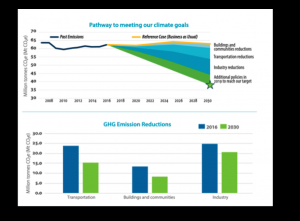 The future of economic prosperity in B.C. lies in harnessing our innate potential for innovation and bringing new, more efficient technologies to bear in the resource sector.
The future of economic prosperity in B.C. lies in harnessing our innate potential for innovation and bringing new, more efficient technologies to bear in the resource sector.
B.C. will never compete in digging dirt out of the ground with jurisdictions that don’t internalize the same social and environmental externalities that we value.
We will excel through being smarter, more efficient, cleaner and by working together to solve our problems.
This means that we not only export the dirt, but we also export the knowledge, technology and value added products associated with resource extraction.
To get a fair value for our resources that deliver maximum benefits to our communities, we need to get smarter and more strategic when it comes to embracing innovation.
Government should be doing more to support these initiatives and create fertile ground for a sustainable, resilient, and diverse economy.
We should be using our boundless renewable energy resources to attract industry, including the manufacturing sector, that wants to brand itself as sustainable over its entire business cycle, just like Washington and Oregon have done.
We should be setting up seed funding mechanisms to allow the B.C.-based creative economy sector to leverage venture capital from other jurisdictions to our province.
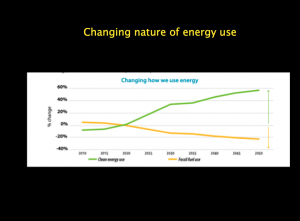 By steadily increasing emissions pricing, we can send a signal to the market that incentivizes innovation and the transition to a low carbon economy.
By steadily increasing emissions pricing, we can send a signal to the market that incentivizes innovation and the transition to a low carbon economy.
The funding could be transferred to municipalities across the province so that they might have the resources to deal with their aging infrastructure and growing transportation barriers.
Yes, we should be investing in trade skills, as described, for example, under a B.C. jobs plan.
But we should also be investing further in education for 21st century industries like biotech, high tech and cleantech. It’s critical that we bring the typically urban-based tech and rural-based resource sectors together.
Similarly natural gas has an important role to play, but we should use it to use in our domestic market and explore options around using it to power local transport.
Global investment trends are being driven by the world’s shared Paris commitments, predicated on the fact that keeping global warming under 2 degrees Celsius is far more cost-effective than dealing with the effects of a temperature rise above that level.
This shift presents a significant opportunity for B.C.’s economy.
Our province is well poised to bolster its leadership in the cleantech sector – we have a strong competitive advantage in the building blocks required to foster a knowledge-based economy.
For we know responding to the challenge of climate change is both an intergenerational opportunity and an intergenerational responsibility.
CleanBC’s sectoral approach doesn’t simply show a plausible pathway to meeting our targets – rather, it drives a return to the vision of a clean 21st century economy.
We have one of the best public services in the world and for a long time they have had the policies ready to get us there.
 What has been missing is political leadership. This minority government must – and will – show that leadership.
What has been missing is political leadership. This minority government must – and will – show that leadership.
I’m hopeful, but still wary of our starting point and the strength of the status quo.
Yet I am truly excited about the prospects that lie ahead for this minority government. We’ve accomplished a remarkable amount already in just two short years.
But there is so much more to do. The years ahead will require all of us to come together to look for areas where we can be partners – to drive the innovation that will enable us to electrify our economy and decarbonize our energy systems. I don’t doubt that many of the emerging solutions we need will in fact come from the people in this room.
The transition to a low carbon economy presents an exciting challenge for the Clean Energy sector. For example, one of the flagship proposals within CleanBC is the aggressive Zero Emission Vehicle which came into law with the passage last week of the Zero Emission Vehicle Act.
 This act mandate that zero-emitting vehicle must make up 10% of light-duty vehicle sales by 2025, 30% by 2030, and 100% by 2040. The good news is that in the month of May alone, 15% of all new light-duty vehicle sales were zero-emitting.
This act mandate that zero-emitting vehicle must make up 10% of light-duty vehicle sales by 2025, 30% by 2030, and 100% by 2040. The good news is that in the month of May alone, 15% of all new light-duty vehicle sales were zero-emitting.
With the electrification of the transportation sector and our built environment comes the opportunity for innovation in smart grid systems.
Whether it be interconnecting myriad distributed production, with innovative local storage systems and point to point high voltage DC transmission, or whether it be the design of new electric transportation systems, or whether it be electrification of our natural resource sector, Clean Energy BC has a strong and vibrant future in our province.
And I remain committed to your sector and I ask that you help me help you. I don’t know what I don’t know. I don’t have all the solutions… but, I know that it is not this: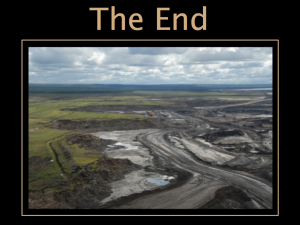
On the decline of BC’s caribou and old growth forests
Today in the legislature I rose during Question Period to ask the Minister of Forests, Lands and Natural Resource Operations two distinct questions. In the first, I asked how he reconciles his Ministry’s efforts to preserved at-risk caribou herds while at the same time issuing more hunting permits for the same caribou. In the second question I ask him what he plans to do to preserve the last remaining old growth valley-bottoms on Vancouver Island.
Below I reproduce the text and video of our exchange.
Video of Exchange
Question
A. Weaver: I’ve just been walking around with a smile on my face today from ear to ear, and I continue to ask that question in that spirit.
There are 54 caribou herds in British Columbia, 30 of which are at risk of extirpation. Fourteen have less than 25 animals, and the B.C. Government website lists that one of these herds has precisely one individual, whereas another has three. Since the information was posted on the site, it’s likely that they’re gone as well.
British Columbia’s caribou herds are in crisis, and scientists have been raising the alarm for many, many years. After nearly managing the species into oblivion, we’re now desperately trying to save them by any means possible. Yet, at the same time as we try to avoid extirpation in one area, in a neighbouring area, the government issues and permits a legal caribou hunt.
To the Minister of Forests, Lands, and Natural Resource Operations: aside from the First Nations’ food, social and ceremonial hunt, how many caribou is he permitting to be hunted in British Columbia in the 2019-2020 limited area hunt and general open season in management units 617 to 620 and 622 to 627?
Answer
Hon. D. Donaldson: Thank you to the Leader of the Third Party for the question to talk about an important animal, an iconic species in B.C. and across Canada and internationally. That is the caribou.
I think it’s been pointed out already in question period so far that unlike the old government, we take the decline in caribou populations very seriously. Going back to 2003, the previous government ignored calls for action to protect caribou habitat for over a decade and kept in place a patchwork of measures that don’t meet federal standards, putting jobs at risk and caribou at risk.
As far as the hunting of caribou that the member asked about, we know that the Chase, Wolverine and Itch-Ilgachuz herds are classified as threatened, and the herd populations continue to decline. That’s why we closed the caribou hunt for these three herds this past March, and this hunt will remain closed until further notice. There are some herds that are still available for hunting, and those are the Carcross and Atlin herds in my constituency, in the northwest corner of B.C. Both herds have in excess of 800 animals.
The member is right. When it’s based on the best available science, and when conservation is the top priority, followed by First Nations’ food spiritual and ceremonial needs, only then is hunting allowed. There are very few animals available for hunt — approximately ten.
Supplementary Question
A. Weaver: Well, that’s inconsistent with the information I have here, where it looks like 268 permits have been issued for caribou in Skeena region 6, which would be ironic in light of the fact the minister just mentioned 800-some animals in and around that area.
The point I’m making here is we’re hunting caribou while we try to save caribou. There’s no overall strategy. Caribou, as we know, are dependent on old-growth boreal and mountain economic systems. For many herds, their main food source is lichen that grows on old trees, and cutblocks and logging roads make them much more vulnerable to predators, as we all know.
Yesterday the United Nations released a landmark study reporting that over a million species are now at risk of extinction, and habitat loss is the driving factor. In B.C., we only act when it’s already too late. For example, our invaluable Vancouver Island valley-bottom old growth is globally rare and is an essential habitat for many species.
My question is again to the Minister of Forests, Lands and Natural Resource Operations. Will this government stop its Loraxian approach to resource management and step in to protect the last intact, productive valley-bottom old growth on Vancouver Island?
Answer
Well, I understand we were talking about caribou. There are no caribou on Vancouver Island. I’m sure the member knows that. As far as old-growth forests go on Vancouver Island, we’re committed to creating an old-growth plan in consultation with industry, in consultation with environmental NGOs and in consultation with communities.
We know that old-growth forests provide incredibly important habitat for biodiversity. There are over 500,000 hectares of old growth already protected on Vancouver Island through protected areas and parks. We also know that old-growth forests provide important revenue for communities and important jobs for forestry workers. We’ll continue to manage old growth in a sustainable way, and we’ll continue to work on the caribou file to protect jobs and to protect caribou.

